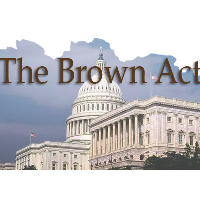Open Government Put on Hold for Budget Reasons

California, leaving no stone unturned in its hunt for budgetary savings, has suspended key elements of the state’s 58-year-old landmark open government act in order to save $96 million in 2012-13.
The Ralph M. Brown Act, named for the Modesto Assemblyman who authored it, applies to state and local government and requires at least 72 hours notice for a public meeting, the posting of agendas ahead of time and limitations on conducting public business in private meetings. The act applies to state agencies and thousands of local entities, including many special districts, school districts, city councils, boards and commissions.
The Brown Act is a key element of the state’s government transparency efforts. It is augmented by Proposition 59, a constitutional amendment passed by 83% of the voters in 2004 which guarantees the right of public access to meetings of government bodies and writings of government officials. The so-called “sunshine amendment” enshrined in law the principle that the more public access made available, the better.
The state didn’t actually say no one should observe the Brown Act; it simply added a budget bill trailer that said it won’t be reimbursing anyone for the expense of posting their agendas in advance, providing descriptions of each agenda item, disclosing any items that will be discussed in closed session and reporting in public session, prior to adjournment, any actions taken behind closed doors.
All of that costs money.
For instance, Marin County submitted claims for $61,957 to cover the cost of postings in 2010-11. Governor Jerry Brown spokeswoman Elizabeth Ashford said, “Our expectation is that local governments will continue doing the people's business in a transparent manner.”
Many individual locales have their own open government ordinances that will remain in effect and others have indicated that they will continue to observe the Brown Act even without remuneration from the state. But that is a locale by locale determination.
Full reimbursement for Brown Act activities will be restored if Governor Brown’s tax initiative passes in November.
–Ken Broder
To Learn More:
Several Cities Say They Will Continue to Follow Suspended State Open-Meeting Rules (by Neil Nisperos, Inland Valley Daily Bulleting)
Open Government at Heart of Budget Cut (by John King, San Francisco Chronicle)
The Brown Act (pdf)
- Top Stories
- Controversies
- Where is the Money Going?
- California and the Nation
- Appointments and Resignations
- Unusual News
- Latest News
- California Forbids U.S. Immigration Agents from Pretending to be Police
- California Lawmakers Urged to Strip “Self-Dealing” Tax Board of Its Duties
- Big Oil’s Grip on California
- Santa Cruz Police See Homeland Security Betrayal in Use of Gang Roundup as Cover for Immigration Raid
- Oil Companies Face Deadline to Stop Polluting California Groundwater





